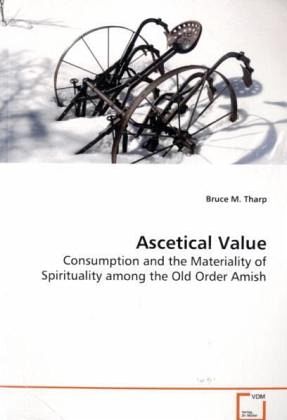
Ascetical Value
Consumption and the Materiality of Spirituality among the Old Order Amish
Versandkostenfrei!
Versandfertig in 6-10 Tagen
52,99 €
inkl. MwSt.

PAYBACK Punkte
26 °P sammeln!
The Old Order Amish of Elkhart-LaGrange, Indiana aredistinctive in their acceptance of and reliance uponemployment in local (non-Amish) industrial factories,which provides greater disposable income and greaterleisure time than their farming brethren. Contraryto conventional notions of their asceticism, theseAmish are engaged in consumptive activities such asriding in automobiles, eating in restaurants, andusing some electric-powered technologies. This textexplores (1) the notion of asceticism and theAmish reconciliation of their religiously-groundedtenets of industry, frugality, and the separa...
The Old Order Amish of Elkhart-LaGrange, Indiana are
distinctive in their acceptance of and reliance upon
employment in local (non-Amish) industrial factories,
which provides greater disposable income and greater
leisure time than their farming brethren. Contrary
to conventional notions of their asceticism, these
Amish are engaged in consumptive activities such as
riding in automobiles, eating in restaurants, and
using some electric-powered technologies. This text
explores (1) the notion of asceticism and the
Amish reconciliation of their religiously-grounded
tenets of industry, frugality, and the separation
from worldliness, with an increasingly pervasive and
seemingly persuasive culture of consumption; (2)
the construction of value surrounding actual
household possessions; and (3) their understanding of
what the material sphere and its expansion means in
terms of Amishness and its future.
distinctive in their acceptance of and reliance upon
employment in local (non-Amish) industrial factories,
which provides greater disposable income and greater
leisure time than their farming brethren. Contrary
to conventional notions of their asceticism, these
Amish are engaged in consumptive activities such as
riding in automobiles, eating in restaurants, and
using some electric-powered technologies. This text
explores (1) the notion of asceticism and the
Amish reconciliation of their religiously-grounded
tenets of industry, frugality, and the separation
from worldliness, with an increasingly pervasive and
seemingly persuasive culture of consumption; (2)
the construction of value surrounding actual
household possessions; and (3) their understanding of
what the material sphere and its expansion means in
terms of Amishness and its future.












